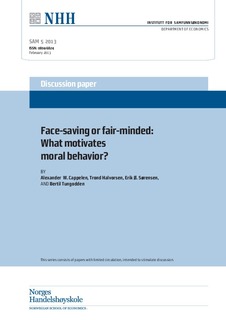| dc.contributor.author | Cappelen, Alexander W. | |
| dc.contributor.author | Halvorsen, Trond | |
| dc.contributor.author | Sørensen, Erik Ø. | |
| dc.contributor.author | Tungodden, Bertil | |
| dc.date.accessioned | 2013-03-14T12:27:39Z | |
| dc.date.available | 2013-03-14T12:27:39Z | |
| dc.date.issued | 2013-02 | |
| dc.identifier.issn | 0804-6824 | |
| dc.identifier.uri | http://hdl.handle.net/11250/163338 | |
| dc.description.abstract | We study the relative importance of intrinsic moral motivation and extrinsic
social motivation in explaining behavior in the dictator game. We introduce
a novel design that manipulates these two dimensions. The paper offers four
main findings. First, intrinsic moral motivation is of fundamental importance.
Second, extrinsic social motivation matters and is crowding-in with intrinsic
moral motivation. Third, extrinsic social motivation generates behavior consistent
with some participants being motivated by guilt and shame and others
by social esteem and pride. Fourth, sharing behavior in the dictator game is
strongly associated with charitable giving outside the lab and with political
preferences. | no_NO |
| dc.language.iso | eng | no_NO |
| dc.publisher | Norwegian School of Economics, Department of Economics | no_NO |
| dc.relation.ispartofseries | Discussion paper;5/2013 | |
| dc.title | Face-saving or fair-minded : what motivates moral behavior? | no_NO |
| dc.type | Working paper | no_NO |
| dc.subject.nsi | VDP::Social science: 200::Economics: 210::Economics: 212 | no_NO |
